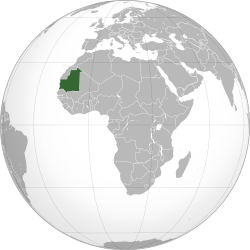Mali Intervention Worries Mauritanians
By Magharebia
By Jemal Oumar
While Mauritania has not taken an official public stance on the Mali crisis, political parties have been more vocal about how they feel about a possible intervention.
The National Rally for Reform and Development Party (Tawassoul) on Sunday (September 30th) warned of the “fatal negative consequences on the Sahel and Sahara of any foreign intervention by Western states in the Azawad region in northern Mali”.

“We refuse that northern Mali be turned into a theatre for a regional war, the consequences and duration of which nobody can predict, given that Mauritania will inevitably be the first country to be harmed by that war, and that terrorism only will benefit from it,” the Islamist party said in a statement.
Still, the party insisted that “neighbouring countries, African Union and UN have to exert all possible efforts and exercise all forms of pressure on the brotherly rivals to sit at the negotiating table and solve their problems through dialogue and friendly settlement instead of resorting to force and violence”.
The goal is to “protect Mali’s territorial integrity, preserve the rights of all components of the brotherly Malian people and address all grievances that Azawad region was a victim of”, according to Tawassoul.
The statement of the Islamist party sparked mixed reactions from Mauritanian elites.
“Tawassoul rejects President Mohamed Ould Abdel Aziz’ policy in Mali, especially with the publicity done for the France-led Western intervention in that country and the possibility that Mauritania itself could be the spearhead in that war,” political analyst Mohamed Salem told Magharebia.
“It’s known that Mauritania will be the first party to be affected because of the proximity of al-Qaeda and the long borders,” he added.
During last Sunday’s visit to Algiers, US Africa Command (AFRICOM) commander General Carter F. Ham commented that “the only alternative which could not exist is the American military presence in northern Mali”.
Analyst Salem interpreted this statement as American “support of the Algerian position”, which is based on the political solution.
“Mauritania’s participation in this war would negatively affect Mauritania’s security because the terrorist organisations in northern Mali would be themselves forced to find a haven after suffering strong blows and resort to mobilising their silent cells in Mauritania,” commented Sahara Media manager Sidi Mohamed Ould Younis.
He added that al-Qaeda in the Islamic Maghreb (AQIM) did not feel “a real danger” from Mauritania in the past few years but that may change if Mauritania gets militarily involved in Mali. AQIM “will resort to all means to target the regime as the entity that took the war decision”, according to Salem.
Journalist and poet Aboubacr Ould Elmami had a different opinion. Mauritania cannot “stand idly by” as the security situation in Mali has a direct impact on Mauritania.
“The best proof of that is the painful accident in which Mauritanian imams were killed there a few weeks ago. Therefore, the Mauritanian authorities must only determine how they can help bring the situation in Mali back to normal,” Ould Elmami explained.
Meanwhile, young political activist Mohamed Ould Amar expressed hope that differences on the Mali situation would not lead to political divides within Mauritania.
“The current circumstances can’t bear that, and everyone should bring their views on this issue, which is basically a security issue before being a political issue, closer,” he said. “As to average citizens, they are only concerned with their personal security and securing their lives.”
